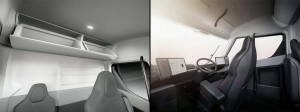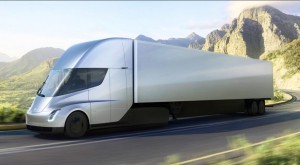The popularity of Tesla’s not-yet-on-the-road semi continues as UPS became the latest company to plunk down big money to place an order. UPS wants 125 trucks, Tesla’s largest order to date.
The truck, which was unveiled in November, provides unparalleled performance, such as a zero to 60 time of five seconds unloaded and 20 seconds with a full 80,000-pound load. It features an simplified interior where the driver sits in the center of the cab and streamlines all of the information and data a driver needs into two simple screens.
Tesla’s founder and CEO Elon Musk said the company will begin producing the trucks in 2019.
“It’s too soon to know where they’ll be deployed,” said Mike Mangeot, UPS spokesman in Louisville. “We’d love to have some in Louisville to join the hybrid electric and compressed natural gas alt-fuel vehicles that we’re already using the metro area.”
(PepsiCo joins list of Tesla semi truck buyers. Click Here for the story.)
Tesla claims the semi, which was unveiled last month, has a range of 500 miles when towing a full 80,000-pound load, and that 400 miles of range can be restored in just 30 minutes at one of its new Megacharger stations.

The new Tesla truck interior is simple and clean, eliminating the multitude of equipment that often litters the cab of current semi trucks.
UPS joins PepsiCo, which ordered 100 trucks, Walmart ordered 15 electric trucks and J.B. Hunt trucking has said its reserved “multiple” semis, food service distributor Sysco has ordered 50 trucks and Anheuser-Busch has reserved 40.
The trucks are expected to cost between $150,000 and $200,000, depending upon how they’re equipped, Tesla said at the unveiling. The vehicles will save money because they are cheaper to operate, Musk noted. A standard diesel truck would be 20% more expensive to operate than a Tesla truck: $1.26 per mile compared to $1.51 per mile, according to USA Today.
(Click Here for more about Tesla’s new semi truck.)
“For more than a century, UPS has led the industry in testing and implementing new technologies for more efficient fleet operations,” said Juan Perez, chief information and engineering officer for UPS. “We look forward to expanding further our commitment to fleet excellence with Tesla.”
UPS has provided Tesla real-world UPS trucking lane information as part of the company’s evaluation of the vehicle’s expected performance for the UPS duty cycle. UPS frequently partners with suppliers of emerging vehicle technologies to help them develop solutions that prove ready for stringent UPS use-cases.
The company installed collision mitigation equipment on its current trucks so Tesla’s driver-assistance features were appealing. The company noted that they have been found by the U.S. government to reduce crash rates by 40%.
(Tesla’s big surprise: its gen-2 Roadster – and Musk promises it will be the “world’s fastest production car.” Click Here for the mind-bending numbers.)
In addition to the safety technology, the new trucks help UPS meet some of its environmental goals as well, including a reduction of its absolute greenhouse gas (GHG) emissions from global ground operations 12% by 2025.

